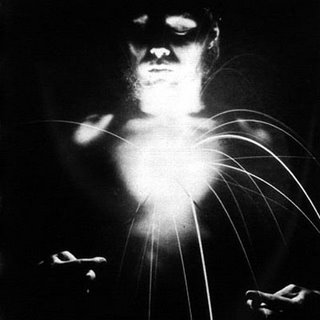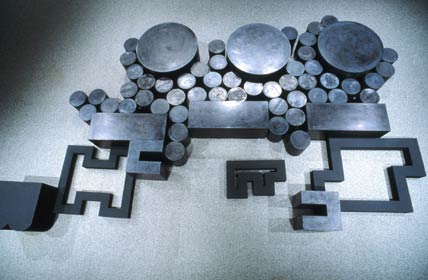MakerThinker: To Joel... It's Still Not Craft, My Dear!

First of all, I am in the market for a new title. MakerThinker sounds like software. Ideas?
Joel Murphy, you vote that craft is makerthinking most of the time, and Leisurearts also veers in that direction in their thoughtful analysis of cooking v. cheffing. And I want to make an argument that is, I think, mostly semantic. This whole problem of doing the work and learning from the work itself is so fucking political, so wrapped up in power. There is no power in overusing the word craft, in making the word craft encompass too much. And for me, this is about reclaiming intellectual power.
You argue that there is good craft and bad craft. Good craft is care, experimentation and basically figuring out how to pay attention and retain those little bits of knowledge that come your way when you do stuff. Bad craft is about right and wrong. I see where you are going with this, and have similar sentiments. But I need to throw in different words because this is confusing and collapses an idea that could sit up straight and tall.
I would like to make a working definition of craft that separates it from MakerThinking. The purpose of this is not to denigrate craft. Rather, my goal is to find and expose those smart relationships to craft. I want to examine ways to plug into craft from an intellectually powerful place, and thereby maximize its value.
Right now, its value is not being maximized because the only real discussions going on in the art world about how things are done are marred by this stupid class war. Dragging out the word craft in this context is a tactical error, because it sits too tidily inside the existing paradigm. To be above craft is to have money and succeed in the art market. To gnash and sweat over craft is to show off your provincial state school education and guarantee that you will never get a chance to make your own work if you were silly enough to move to New York City, which might as well be Babylon or Gomorrah right now if you happen to be walking around Chelsea. This is a losing proposition for the MakerThinker. It promotes division. Thinkers assume that they know what craft means and assume that it's a commodity. Makers use craft to judge and build walls between themselves and the art that is being made right now.
To do that is to ignore a whole big useful body of work that depends on thinking as a maker thinks. Dennis Oppenheim, Dan Graham, Barry La Va, Bruce Nauman, William Wegman, Eleanor Antin, Marina Abramovic and Ulay, Yoko Ono, Chris Burden, Vito Acconci... all those crazy endurance freaks and all that betacam video footage of people doing ordinary things... the seventies is very relevant to this discussion, and could blow a big hole in all that mealy research-based neoconceptualism that reigns today. All that performance art was interesting precisely because it explored a set of kinetic thinking strategies that stand outside craft.
But that performance art tradition wears the word craft poorly, which is good, because we need a new word or two, and some definitions.
Craft: the study and application of any building or making tradition. Craft connotes history. It is passed from one person to another directly through apprenticeships and teacher/student relationships, and indirectly through books and videos and remembering every time you do a dumb thing. It is a way of working that acknowledges right and wrong ways to do it. Craft-based thinking has its foundation in the fact that people have been making stuff for millenia. It smartly uses this collective body of information gleaned from daily interactions with materials to describe and codify best practices.
Craft is concerned with maximizing human output, both in terms of quality and quantity. Craft says: Don't re-invent the wheel. Learn from my mistakes. That way will scar the wood, do it like this. Flour that cake pan. Good craftspeople are a dream to watch in a shop. They minimize effort all day long. They do only what they have to do. Craftspeople don't flail for a reason. They stand atop and move from the craft, the history, of what they are doing.
Craft is extremely powerful. Learning a craft is a great way to practice larger MakerThinker concepts, like how to pay attention to what you are doing. But it is crucial to keep in mind that craft is powerful because it is telling you what to do. It is telling you that for hundreds of years people have faced very similar sets of problems when working, and it offers solutions that are valuable because they have been tested by millions of others.

Doorway to Heaven was not good craft! Any good craftsperson will tell you to minimize your body's toil, your body's wear and tear! Doorway to Heaven was a different thought process entirely. Doorway to Heaven tested Burden's existing knowledge about electricity with Burden's body. The high stakes of the gesture combine with the title to create a beautiful little poem that transcends what we know about electricity and evokes fear of mortality and individualism and ego.
Craft is not absent. Without craft, or the bodies of physical knowledge that have been collected over millenia, Burden could have killed himself, or knocked down a museum wall, or just made a lame gesture. But Burden is not a craftsperson. Burden is a makerthinker. He uses craft as a knowledge base, a reference.
Joel, you are right. Craft is always there. It must be, because it is the body of existing knowledge, and it would be retarded to stop recording what you learn so that you don't have to relearn it every day. It is the kinetic thinker's library. But there is a serious pitfall to talking about craft that needs to be made explicit. Craft does exist so that you don't have to think so much. And even as Dale Chihuly and Jeffrey Deitch are smoking cigars in some richly appointed backroom, lounging in their faith that they understand this and are therefore on top of the maker/thinker divide, there is still intellectual heavy lifting to be done. There are people using craft as a lever and not a crutch (Burden, SRL, YOU!). There are people who use craft as a springboard or as resistance (Dan Graham, Barry La Va, The Great Negator Alan Kaprow). There are people doing jujitsu with craft (Streb), and there are people who are actively makerthinking without dealing in craft at all (Nauman, Sophie Calle).
These specific relationships between kinetic thinking and craft are worth teasing out, and can only be thoroughly examined when the word craft is not asked to take on both the body of knowledge itself and the act of using the knowledge. That would be like calling writing "books".


1 Comments:
D - this is belated but I thought this to be a fantastic post. I love the definition on craft.
Post a Comment
<< Home